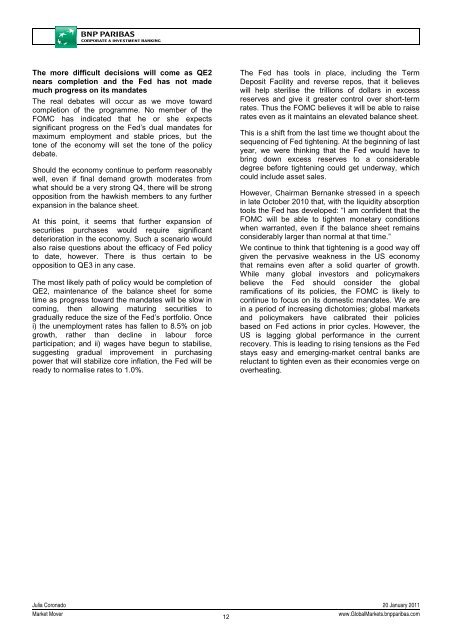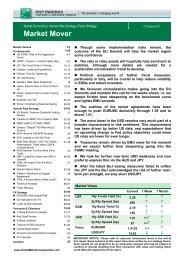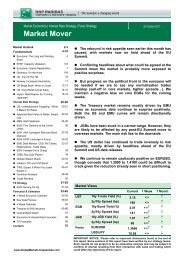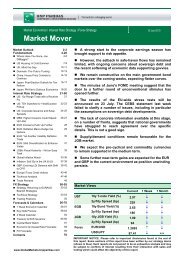Market Economics | Interest Rate Strategy - BNP PARIBAS ...
Market Economics | Interest Rate Strategy - BNP PARIBAS ...
Market Economics | Interest Rate Strategy - BNP PARIBAS ...
You also want an ePaper? Increase the reach of your titles
YUMPU automatically turns print PDFs into web optimized ePapers that Google loves.
The more difficult decisions will come as QE2<br />
nears completion and the Fed has not made<br />
much progress on its mandates<br />
The real debates will occur as we move toward<br />
completion of the programme. No member of the<br />
FOMC has indicated that he or she expects<br />
significant progress on the Fed’s dual mandates for<br />
maximum employment and stable prices, but the<br />
tone of the economy will set the tone of the policy<br />
debate.<br />
Should the economy continue to perform reasonably<br />
well, even if final demand growth moderates from<br />
what should be a very strong Q4, there will be strong<br />
opposition from the hawkish members to any further<br />
expansion in the balance sheet.<br />
At this point, it seems that further expansion of<br />
securities purchases would require significant<br />
deterioration in the economy. Such a scenario would<br />
also raise questions about the efficacy of Fed policy<br />
to date, however. There is thus certain to be<br />
opposition to QE3 in any case.<br />
The most likely path of policy would be completion of<br />
QE2, maintenance of the balance sheet for some<br />
time as progress toward the mandates will be slow in<br />
coming, then allowing maturing securities to<br />
gradually reduce the size of the Fed’s portfolio. Once<br />
i) the unemployment rates has fallen to 8.5% on job<br />
growth, rather than decline in labour force<br />
participation; and ii) wages have begun to stabilise,<br />
suggesting gradual improvement in purchasing<br />
power that will stabilize core inflation, the Fed will be<br />
ready to normalise rates to 1.0%.<br />
The Fed has tools in place, including the Term<br />
Deposit Facility and reverse repos, that it believes<br />
will help sterilise the trillions of dollars in excess<br />
reserves and give it greater control over short-term<br />
rates. Thus the FOMC believes it will be able to raise<br />
rates even as it maintains an elevated balance sheet.<br />
This is a shift from the last time we thought about the<br />
sequencing of Fed tightening. At the beginning of last<br />
year, we were thinking that the Fed would have to<br />
bring down excess reserves to a considerable<br />
degree before tightening could get underway, which<br />
could include asset sales.<br />
However, Chairman Bernanke stressed in a speech<br />
in late October 2010 that, with the liquidity absorption<br />
tools the Fed has developed: “I am confident that the<br />
FOMC will be able to tighten monetary conditions<br />
when warranted, even if the balance sheet remains<br />
considerably larger than normal at that time.”<br />
We continue to think that tightening is a good way off<br />
given the pervasive weakness in the US economy<br />
that remains even after a solid quarter of growth.<br />
While many global investors and policymakers<br />
believe the Fed should consider the global<br />
ramifications of its policies, the FOMC is likely to<br />
continue to focus on its domestic mandates. We are<br />
in a period of increasing dichotomies; global markets<br />
and policymakers have calibrated their policies<br />
based on Fed actions in prior cycles. However, the<br />
US is lagging global performance in the current<br />
recovery. This is leading to rising tensions as the Fed<br />
stays easy and emerging-market central banks are<br />
reluctant to tighten even as their economies verge on<br />
overheating.<br />
Julia Coronado 20 January 2011<br />
<strong>Market</strong> Mover<br />
12<br />
www.Global<strong>Market</strong>s.bnpparibas.com

















